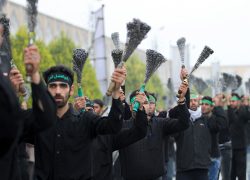The Isfahan School of Comedy Theatre offers ways to achieve a better life by addressing local customs and traditions, and criticising ugliness and anomalies to correct wrong behaviours and appreciate morals, using a humorous language.
This school is different from Siah-Bazi, Takht-e Howzi and more than forty other types of comedy all over the world, and in such aspects as criticality and improvisation, bears little resemblance to critical comedy and commedia dell’arte.
The school may be traced back to pre-Islamic times, when Isfahan was a military camp, and humour was used to entertain the soldiers, especially during the Parthian and Sassanid eras, but in written documents, its earliest evidence dates to Isfahani satirists such as Talhak (Talkhak) in the court of Sultan Mahmud of Ghazni, Kal Enayat in the court of Shah Abbas, Karim Shire’i and Esmail Bazzaz in the court of Nasser al-Din Shah Qajar.
Around 1921, artists such as Mehdi Khan Vaziri, Jamnejad, Mirza Rafiei (Aqajan Rafiei), and Nasser Farahmand strove for the improvement of this school, and Mehdi Momayyezan and Reza Arham Sadr played a key and valuable role in this regard.
The Isfahan School of Comedy Theatre reached its peak during the 1950s to 70s.
The main values of this school include liveliness and having direct contact with the audience, being popular and defending the rights of the oppressed, fighting the oppressors, openly criticizing the anomalies of the society, direct engagement with current social and economic issues, improvisation in line with the play’s subject, fertility of language and dialect based on deep ideas and indigenous cultures, showing anomalies using a humorous and dramatic language, departing from the role (distancing) and criticizing anomalies as well as praising norms in order to achieve a better life.
The central actor of this theatrical school must also be aware of the political and social conditions of the country and the world and have improvisation skills, flexibility of body, and the ability to use gestures to present concepts and make the audience laugh.







